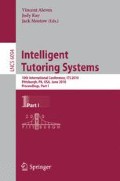Abstract
The impact of affect on learning has been the subject of increasing attention. Because of the differential effects of students’ affective states on learning outcomes, there is a growing recognition of the important role that intelligent tutoring systems can play in providing affective feedback to students. Although we are only beginning to understand the complex interactions between affect, feedback, and learning, it is evident that affective interventions can both positively and negatively influence learning experiences. To investigate how student personality traits can be used to predict responses to affective feedback, this paper presents an analysis of a large student affect corpus collected from three separate studies. Student personality profiles augmented with goal orientation and empathetic tendency information were analyzed with respect to affect state transitions. The results indicate that student personality profiles can serve as a powerful tool for informing affective feedback models.
Access this chapter
Tax calculation will be finalised at checkout
Purchases are for personal use only
Preview
Unable to display preview. Download preview PDF.
References
Conati, C., Mclaren, H.: Data-Driven Refinement of a Probabilistic Model of User Affect. In: Ardissono, L., Brna, P., Mitrović, A. (eds.) UM 2005. LNCS (LNAI), vol. 3538, pp. 40–49. Springer, Heidelberg (2005)
D’Mello, S., Taylor, R.S., Graesser, A.: Monitoring Affective Trajectories during Complex Learning. In: Proceedings of the 29th Annual Meeting of the Cognitive Science Society, pp. 203–208 (2007)
Baker, R., Rodrigo, M., Xoloctzin, U.: The Dynamics of Affective Transitions in Simulation Problem-Solving Environments. In: Proceedings of the 2nd International Conference on Affective Computing and Intelligent Interactions, pp. 666–677 (2007)
Burleson, W.: Affective Learning Companions: Strategies for Empathetic Agents with Real-time Multimodal Affective Sensing to Foster Meta-Cognitive and Meta-Affective Approaches to Learning, Motivation, and Perseverance. PhD thesis, Massachusetts Institute of Technology (2006)
McQuiggan, S.W., Lee, S.Y., Lester, J.C.: Early prediction of student frustration. In: Paiva, A.C.R., Prada, R., Picard, R.W. (eds.) ACII 2007. LNCS, vol. 4738, pp. 698–709. Springer, Heidelberg (2007)
de Vicente, A., Pain, H.: Informing the Detection of the Students’ Motivational State: An Empirical Study. In: Cerri, S.A., Gouardéres, G., Paraguaçu, F. (eds.) ITS 2002. LNCS, vol. 2363, pp. 933–943. Springer, Heidelberg (2002)
Beal, C., Lee, H.: Creating a Pedagogical Model that Uses Student Self Reports of Motivation and Mood to Adapt ITS Instruction. In: Workshop on Motivation and Affect in Educational Software, in conjunction with the 12th International Conference on Artificial Intelligence in Education (2005)
Kort, B., Reilly, R., Picard, R.: An Affective Model of Interplay between Emotions and Learning: Reengineering Educational Pedagogy–Building a Learning Companion. In: Proceedings IEEE International Conference on Advanced Learning Technology: Issues, Achievements and Challenges, pp. 43–48 (2001)
Picard, R., Papert, S., Bender, W., Blumberg, B., Breazeal, C., Cavallo, D., Machover, T., Resnick, M., Roy, D., Strohecker, C.: Affective Learning – A Manifesto. BT Technology Journal 22(4) (2004)
Schwarz, N.: Emotion, Cognition, and Decision Making. Journal of Cognition and Emotion 14(4), 440–443 (2000)
Chaffar, S., Frasson, C.: Using an Emotional Intelligent Agent to Improve the Learner’s Performance. In: Woolf, B.P., Aïmeur, E., Nkambou, R., Lajoie, S. (eds.) ITS 2008. LNCS, vol. 5091, pp. 787–789. Springer, Heidelberg (2008)
Forbes-Riley, K., Litman, D.: Investigating Human Tutor Response to Student Uncertainty for Adaptive System Development. In: Proceedings the 2nd International Conference on Affective Computing and Intelligent Interactions (2007)
McQuiggan, S., Robison, J., Phillips, R., Lester, J.: Modeling Parallel and Reactive Empathy in Virtual Agents: An Inductive Approach. In: Proceedings of the 7th International Joint Conference on Autonomous Agents and Multi-Agent Systems (2008)
Robison, J., McQuiggan, S., Lester, J.: Modeling Task-Based vs. Affect-Based Feedback Behavior in Pedagogical Agents: An Inductive Approach. In: Proceedings of the 14th International Conference on Artificial Intelligence in Education, pp. 25–32 (2009)
Robison, J., McQuiggan, S., Lester, J.: Evaluating the Consequences of Affective Feedback in Intelligent Tutoring Systems. In: Proceedings of the 3rd International Conference on Affective Computing and Intelligent Interaction (2009)
Arroyo, I., Woolf, B., Royer, J., Tai., M.: Affective Gendered Learning Companions. In: Proceedings of the 14th International Conference on Artificial Intelligence in Education, pp. 41–48 (2009)
Robison, J., McQuiggan, S., Lester, J.: Differential Affective Experiences in Narrative-Centered Learning Environments. In: Proceedings of the Workshop on Emotional and Cognitive issues in ITS in conjunction with the 9th International Conference on Intelligent Tutoring Systems (2008)
Rusting, C.: Personality, Mood, and Cognitive Processing of Emotional Information: Three Conceptual Frameworks. Psychological Bulletin 124(2), 165–196 (1998)
McCrae, R., Costa, P.: Personality in Adulthood: A Five-Factor Theory Perspective, 2nd edn. Guilford Press, New York (2003)
Elliot, A., McGregor, H.: A 2 x 2 Achievement Goal Framework. Journal of Personality and Social Psychology 80(3), 501–519 (2001)
Davis, M.: Empathy: A Social Psychological Approach. Brown & Benchmark Publishers, Madison (1994)
Davis, M.: Measuring Individual Differences in Empathy: Evidence for a Multidimensional Approach. Journal of Personality and Social Psychology 44, 113–126 (1983)
Witten, I., Frank, E.: Data Mining: Practical Machine Learning Tools and Techniques, 2nd edn. Morgan Kaufman, San Francisco (2005)
Author information
Authors and Affiliations
Editor information
Editors and Affiliations
Rights and permissions
Copyright information
© 2010 Springer-Verlag Berlin Heidelberg
About this paper
Cite this paper
Robison, J., McQuiggan, S., Lester, J. (2010). Developing Empirically Based Student Personality Profiles for Affective Feedback Models. In: Aleven, V., Kay, J., Mostow, J. (eds) Intelligent Tutoring Systems. ITS 2010. Lecture Notes in Computer Science, vol 6094. Springer, Berlin, Heidelberg. https://doi.org/10.1007/978-3-642-13388-6_33
Download citation
DOI: https://doi.org/10.1007/978-3-642-13388-6_33
Publisher Name: Springer, Berlin, Heidelberg
Print ISBN: 978-3-642-13387-9
Online ISBN: 978-3-642-13388-6
eBook Packages: Computer ScienceComputer Science (R0)

